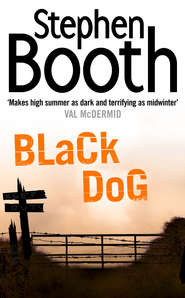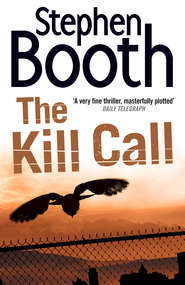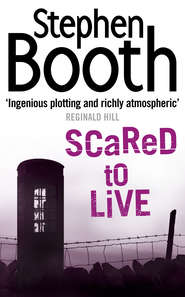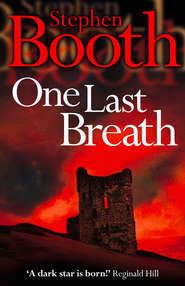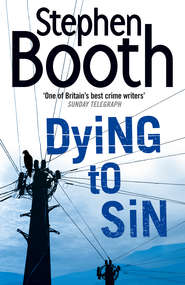По всем вопросам обращайтесь на: info@litportal.ru
(©) 2003-2024.
✖
The Dead Place
Автор
Год написания книги
2019
Настройки чтения
Размер шрифта
Высота строк
Поля
Just downstream, he knew there were two rows of cottages built for the workers at Cressbrook Mill, but they weren’t visible from here. Stepping stones crossed the water down there to help climbers reach the limestone pitches on Ravenscliffe Crags. On the wet margins of the stream grew clumps of a plant that Cooper didn’t recognize – something like a ten-foot-high cow parsley with purple stems and spotted leaf stalks, furred with tiny spines.
‘There’s a footpath at the bottom of your land, isn’t there, sir?’ he said.
‘It isn’t the footpath that’s the problem,’ said Jarvis. ‘That’s been there for centuries, as far as I know. It’s this new law they brought in. This … what is it? … right to roam. Some folk think it gives them the right to go traipsing all over the shop. There was a bunch of them came right down through the paddock and tried to walk across the weir. I don’t mind admitting, I were fair chuffed when one of them fell in the stream. She were near to drowning, judging by her noise.’
Finally, they reached the patch of ground that had been dug out around the remains of the unidentified woman. Blue-and-white police tape still clung to the trunks of nearby trees, some of it trailing on the ground now in sodden strands, one loose end rattling sporadically in the breeze. Cooper couldn’t tell now how wide an area the search had covered.
He hadn’t brought any of the scene photos with him, but could remember them well enough to picture the position of the skeleton. The skull had been at the far end of the excavation, close to the roots of an ash tree; the arms had been slightly bent at the elbow, so that the fleshless hands rested somewhere in the pelvic region, while the legs were laid out straight and close together, with the feet near to where he was standing now.
Cooper looked up through the canopy of trees to locate the sun. The cloud cover wasn’t heavy, and a gleam of brightness was visible, despite the rain. Higher up, on the moors, he could always orient himself if he could see the sun. But down here, among the winding dales and shelving banks of woodland, it was easy to lose his sense of direction.
Most of the available sunlight seemed to be coming from beyond the trees to his left. Since it was morning, that should be approximately southeast. Cooper patted the pockets of his jacket. Somewhere here, he was sure … ah, yes. He pulled out a small Silva compass and swivelled it until he’d oriented the needle to the north. He looked at the grave again. Head there, feet here. He nodded. But it probably meant nothing.
‘What are you doing?’ said Jarvis.
Cooper had almost forgotten him. The man had been so silent and so still that he might as well have merged into the trees. He was standing under the boughs of an oak, with water dripping on to his sweater. He hadn’t bothered to put on a coat before they came down to the stream. In a few more minutes, he’d be as wet as the ground he was standing on.
‘Nothing important, sir,’ said Cooper. ‘Just checking some details.’
‘Routine?’
Jarvis said the word as if it summed up everything that was wrong with the world. This was a world that wouldn’t leave him alone to sit in peace on his porch with his dogs.
‘What’s on the other side of these woods?’ asked Cooper, pointing across the stream to the east.
‘It’s part of the Alder Hall estate.’
‘I’ve never heard of it.’
‘It’s not exactly Chatsworth – though they say it belongs to the Duke again now. The house has been empty for the last two years, anyway. This stream is the estate boundary.’
‘But there’s a fence up there above the trees. That looks as though it ought to be the boundary.’
‘That fence is new. It marks the end of the access land.’
‘Of course.’
The walkers who found the human remains at Litton Foot had been here only as a result of their new freedom under the Countryside and Rights of Way Act. The so-called ‘right to roam’ legislation had opened up a hundred and fifty square miles of private land in the national park to public access for the first time. Otherwise, the remains might have lain undiscovered for years yet. In a different location, they’d probably have been found months ago, before they deteriorated beyond hope of identification.
‘Bad business, it being a woman,’ said Jarvis.
‘Yes.’
‘She doesn’t know. The wife, I mean. She gets upset about stuff like that. Hates these ramblers coming across our land. But I suppose I’d better tell her.’
‘It’ll be in the papers anyway,’ said Cooper.
‘Aye.’
Cooper almost slipped on the stones, and put his hand on to the wall to keep himself upright. The moss covering the wall was thick and fibrous to the touch, like a cheap carpet that had been soaked in a flood and never dried out. It held water as effectively as a sponge, and no air could penetrate it. When he raised his hand from the wall, Cooper’s fingers smelled dank and woody.
‘Well, thank you for your time, sir,’ he said. ‘I think I’ve got what I need for now.’
‘Aye? You don’t need much, then.’
As they walked back towards the house, Cooper noticed an enclosure next to the paddock. A row of old pigsties stood on a concrete apron surrounded by muddy ground and a stone wall, mortared to give it extra stability.
‘Do you raise livestock, Mr Jarvis?’ he said.
‘No. These dogs are enough livestock for me.’
Cooper dug into an inside pocket for one of his cards.
‘If you do happen to remember anyone, sir – I mean if the facial reconstruction rings any bells later on – you will let us know, won’t you? The photographs should be in the papers in a day or so, too. You can contact me at the office on this number, or leave a message.’
Jarvis took the card and glanced at it before tucking it away somewhere in his clothes.
‘Cooper. That’s you, is it?’
‘Yes, sir.’
Cooper braced himself for the inevitable question. Tom Jarvis was local. He would surely know all about Cooper’s father and how he’d met his death. Memories were long in these parts, and he didn’t expect he would ever escape it, no matter how long he lived.
But Jarvis just gave him a quizzical look, no more than the lifting of an eyebrow and a momentary understanding in his dark eyes. And Cooper suddenly found himself liking the man much more.
He walked back through the overgrown garden, the only sounds the swish of his own footsteps in the wet grass and the rattling of raindrops on rusted metal. The place had an air of dereliction, a sense of things that had been left to rot in peace.
Tom Jarvis didn’t come with him to the gate but stood and watched him from the top of the porch steps, with the dogs sprawled at his feet. When Cooper reached his car, he turned to say goodbye.
‘Well, Graceless hasn’t bothered me at all while I’ve been here,’ he said.
‘No, you’re right,’ said Jarvis. ‘The old bitch must not fancy you, then.’
Diane Fry watched DI Hitchens tapping a pen against his teeth and swivelling in his chair. Some of his mannerisms were starting to annoy her, but she tried not to show it too much.
‘The two calls weren’t linked straight away,’ said Hitchens. ‘I didn’t know about the second one myself until this morning, and there was no chance to tell you about it.’
Fry hadn’t bothered looking at the transcript yet. She felt too angry. ‘Where was the call made from? Wardlow again?’
‘We don’t know, Diane. It was too brief to be traced. But they were only a few minutes apart, so it’s a good bet.’
She looked up at the map, finding Wardlow easily this time. ‘It’s an entirely different kind of message, isn’t it?’
‘Yes. The similarities between them are the voice distortion and the timing, otherwise the connection might not have been made at all.’
‘He’s being very specific: “a cemetery six miles wide.” And what does he mean by “the dead place”? Or “a flesh eater”?’
‘We’ll analyse it later,’ said Hitchens. ‘Was your funeral director any use?’







